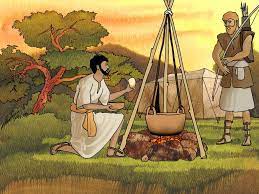Jacob and Esau: A Tale of Birthright and Blessing
Genesis 25:19-34
Introduction
Genesis 25:19-34 presents a fascinating narrative involving the twin brothers Jacob and Esau, their birth, and the consequential sale of Esau’s birthright. This passage provides valuable insights into the historical context and offers several lessons that resonate even in our modern lives.

Setting the Stage
The story takes place during the time of the patriarchs, specifically within the lineage of Abraham. Abraham had two sons, Ishmael and Isaac. Genesis 25:19 states, “These are the generations of Isaac, Abraham’s son.” Isaac married Rebekah, and they were childless for many years until Isaac entreated the Lord, and Rebekah conceived twins.
Genesis 25:24-26 describes the twins’ birth. As Rebekah carried them, they struggled within her, prompting her to inquire of the Lord about the reason for her distress. The Lord revealed to her that two nations were growing within her womb, and they would become divided, with the older serving the younger. This divine revelation foretold the future destinies of the brothers and the reversal of traditional birthright norms.
Character Analysis
Jacob:
Jacob, meaning “supplanter” or “heel-catcher,” was born holding onto Esau’s heel, foreshadowing their lifelong rivalry. He was a quiet and obedient son who preferred dwelling in tents. Jacob is often depicted as cunning and crafty, as we will soon see in his interaction with Esau regarding the birthright.
Esau:
Esau, the older twin, was described as a skillful hunter and a man of the field. He enjoyed outdoor pursuits and was favoured by his father Isaac, who appreciated his ability to bring him tasty game. However, Esau’s impulsive nature and disregard for spiritual matters played a significant role in the subsequent events.
Esau Sells His Birthright
Lessons and Takeaways
Prioritising the Eternal over the Immediate:
Esau’s impulsive decision reveals the danger of prioritising immediate gratification over the long-term consequences. It reminds us to consider the spiritual and eternal aspects of life, rather than being driven solely by our immediate desires.
The Value of Birthright:
Esau’s disregard for his birthright demonstrates the significance of blessings and inheritance within the biblical context. Birthright represented the privileges and responsibilities passed down from one generation to the next. It teaches us to honour and appreciate the spiritual and material legacies we inherit from our families.
The Danger of Envy and Rivalry:
Jacob’s cunning manipulation and Esau’s bitterness highlight the destructive power of envy and rivalry. It warns us against allowing jealousy to consume our hearts and encourages us to strive for harmony and reconciliation in our relationships.
God’s Sovereignty and Election:
The divine revelation to Rebekah that the older would serve the younger emphasiaes God’s sovereign choice in selecting Jacob as the one through whom His covenant promises would continue. This reminds us that God’s plans and purposes often surpass human expectations and conventions.
Conclusion
The account of Jacob and Esau in Genesis 25:19-34 unveils a complex interplay of family dynamics, sibling rivalry, and the consequences of hasty decisions. It provides valuable lessons on the importance of spiritual priorities, the value of birthright, the dangers of envy and rivalry, and the sovereignty of God’s election. By examining this ancient story, we gain insights that are relevant and applicable in our modern lives, guiding us towards wise choices and deeper appreciation for the divine purposes woven throughout our own journeys.
